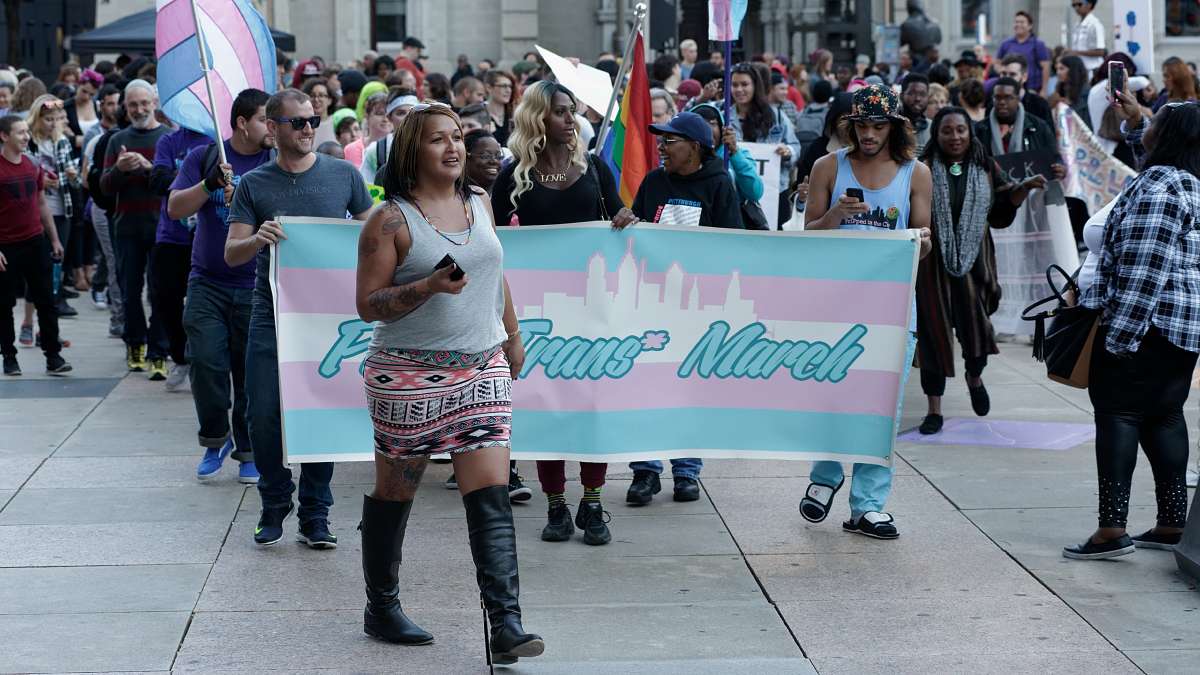Grieving lives lost without reason on Transgender Day of Remembrance

Philadelphia trans activist Naiymah Sanchez leads the 5th Annual Philly Trans
Rita Hester died at 7 p.m. on Nov. 28, 1998. Who was Rita Hester? That’s easy. She was a 38-year-old, African-American woman who lived in Alston, Massachusetts. She was pretty, and she loved rock and roll. A friend described her as, “A very smart, bright young lady. She was a shining star.”
So how did Rita Hester die, and why is her death important enough for me to write about? Well, that’s not so easy to answer, even though it is a matter of public record. Rita Hester’s death certificate states that she died from cardiac arrest. The whole story is that Rita was a transgender woman, and on the night of her “cardiac arrest,” someone stabbed her 20 times in the chest, in Rita’s own apartment.
A brutal stabbing of this nature is evidence of a very personal killing. There was no evidence of forced entry and nothing was stolen. Such frenzied damage is a common feature in many murders of transwomen, usually indicating shame and other emotional turmoil on the part of the killer.
What also does not appear on Rita’s death certificate is that she was killed because she was transgender.
Her community was outraged by Rita’s murder. The outpouring of community grief and anger over her killing led to a candlelight vigil attended by hundreds of people. That vigil inspired the creation of Transgender Day of Remembrance, which is now observed annually on the 20th of November. Over the years, TDOR has grown into the International Transgender Day of Remembrance, with memorials and life celebrations held all across the globe.
Published figures show that 271 transwomen were killed around the world in this last year, and 22 were murdered here in the United States. Of these, 19 were women of color. Adding to the pain, nine transgender adults and, heartbreakingly, 11 children, chose to take their own lives in the ultimate expression of despair.
Here in Philadelphia, two transwomen were murdered in the past 12 months: London Chanel, 21, was murdered in May, and Keisha Jenkins, 22, in October. In addition to the stark numbers, however, is another ugly truth — not all murders of trans people are recorded. Murders of trans people are often just reported as murder. In the case of suicides, unless there is a farewell note, it is usually impossible to know if transgender identity was a factor.
Great progress has been made over the last few years in LGBT rights. In Philadelphia, we enjoy incredible anti-discrimination protections. The relationship between the Police Department and the trans community has improved. However, trans people are still seen by many, including some in the LGB communities, as being “less than” or “other.”
Despite the advances made in the field of LGBT rights, there has been an upsurge in what can best be described as anti–LGBT, and particularly, anti-trans rhetoric. I suspect that this rhetoric contributes to the further devaluation of trans lives. The recent defeat of the Houston Equal Rights Ordinance and the anti-trans smear campaign used to defeat it is just one glaring example. Much of this emanates from the religious right using freedom of religion as cover for their hate speech.
It is with all this in mind that today, many from the Philadelphia Trans community and our friends and allies are coming together to remember and celebrate the lives that have been lost to violence and to hate during this last year.
The ceremony will begin at 6 p.m. at the William Way LGBT Community Center (1315 Spruce Street). All are welcome to attend. If you cannot join us, we would love it if you could take a few minutes out of your day and remember those we have lost.
Remembering transgender Philadelphians
Barbara Brodie, Jan. 3, 1981
Chiron Collins, May 1984
Tianna Langley, March 1, 1985
Cortez Morris, April 17, 1985
Tanya Moore, June 30, 1986
Tina Rodriguez, June 30, 1986
Tina Arroyo, June 30,1986
Lora Vasalio, Aug. 11, 1990
Erica Keels, March 22, 1997
“Unknown,” 1995
Sherry Ransom, June 24, 1998
Anna Francisco, Dec. 12, 1998
“Unknown,” Dec. 22, 1998
Nizah Morris, Dec. 12, 2002
Stacy Blahnik, Oct. 11, 2010
Kyra Cordova, Sept. 3, 2012
Diamond Williams, July 2013
London Kiki Chanel, May 18, 2015
Kiesha Jenkins, Oct. 6, 2015
—
Dawn Munro is a biologist who was born in the UK and has worked in Europe and the United States. She has a long history of social activism dating back to the civil rights era of the 1960s and was active in the Gay Liberation Front. A resident of the John C Anderson LGBT Senior-friendly Apartments, she serves on the boards of the LGBT Elder Initiative andPFLAG. Dawn is grateful to the Big Bang for giving us Planet Earth and to Italy for giving us gelato.
WHYY is your source for fact-based, in-depth journalism and information. As a nonprofit organization, we rely on financial support from readers like you. Please give today.

